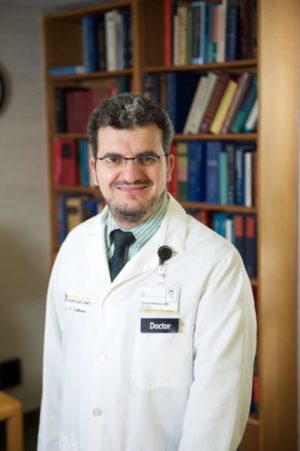August 1, 2018:
Investigator Spotlight
Yousef Zakharia, MD, Holden Comprehensive Cancer Center at the University of Iowa
Education background

MD: Damascus University, Damascus, Syria
Residency: University of Rochester Unity Hospital, Rochester, New York
Fellowships: Michigan State University, Georgia Regents University (Medical College of Georgia)
Research interests
I am assistant professor of medicine in the division of medical oncology and hematology at the University of Iowa and medical oncologist at Holden Comprehensive Cancer Center. I specialize in melanoma and genitourinary malignancy. My research interests are experimental therapeutics and developing novel combinations in melanoma, kidney, and bladder cancers.
The two main projects I have been involved in are:
- Combining the IDO pathway inhibitor indoximod with a PD-1 inhibitor in patients with metastatic melanoma. I have been involved in this clinical trial from the beginning—in the trial design, the LOI, and protocol drafting. I enrolled the very first patient on this multicenter trial. I presented the preliminary results at multiple national and international meetings, including the AACR annual meeting clinical trial plenary session in 2017 and final results at the 2018 ASCO annual meeting.
- An investigator-initiated trial combining high-dose selenium with axitinib in recurrent and refractory clear cell renal cell carcinoma. The background for this trial is based on robust pre-clinical data generated at Roswell Park Cancer Center that suggests that selenium in high doses and certain schedules can downregulate hypoxia induced factor (HIF-a), which is over-expressed in kidney cancer, among other malignancies. Preliminary results of this clinical trial were presented at ASCO GU 2018.
Little-known facts about Dr. Zakharia
- We have one daughter, Chloe Ann, who was born on Thanksgiving Day 2014 at the great University of Iowa.
- I grew up in Syria, which used to be one of the most peaceful countries in the world prior to 2011, and I only have beautiful memories of it.
- The backyard of our Iowa house is on a pumpkin patch that gets busy in the fall. (Come visit!)
- I enjoy playing keyboard, mainly oriental music.
George Weiner, MD, Director of the University of Iowa Holden Comprehensive Cancer Center
 Earlier this year I gave a presentation on cancer medicine and research and was asked to predict what cancer medicine would look like in 25 years. I spoke about two major areas of uncertainty that make it difficult to see into the future. The first is where the science will take us. We are in an amazing era of discovery, and there are surely major advances ahead that will fundamentally change how we think about cancer. The second is how society views and supports research and care across the full spectrum of prevention, early detection, therapy, quality of life and survivorship. Despite these uncertainties, I took a stab at predicting the future.
Earlier this year I gave a presentation on cancer medicine and research and was asked to predict what cancer medicine would look like in 25 years. I spoke about two major areas of uncertainty that make it difficult to see into the future. The first is where the science will take us. We are in an amazing era of discovery, and there are surely major advances ahead that will fundamentally change how we think about cancer. The second is how society views and supports research and care across the full spectrum of prevention, early detection, therapy, quality of life and survivorship. Despite these uncertainties, I took a stab at predicting the future.
I started with what we already know with respect to cancer prevention. We know how to reduce the burden of cancer by reducing exposures such as tobacco, sun and radon; preventing infections that can lead to cancer such as HPV and hepatitis; and living healthy lifestyles. Some of the most dramatic progress is likely to come through personalization of early detection and application of less invasive molecular tests to detect premalignant lesions and early stage cancers. New technologies, such as liquid biopsies and stool testing for shed cancer-associated genes and genes associated with pre-malignant lesions, will increasingly provide non-invasive ways to identify previously invisible abnormalities. An added plus to applying these advances to the general population will be identification of patients with pre-malignant or early stage cancers who do not need invasive, systemic or aggressive therapy. I am confident that in the future, our approaches to early detection and to deciding on the optimal therapeutic approach for premalignant lesions and early stage cancers will be more sensitive, more accurate and more individualized than those we are using today. Such progress will only be possible if society and government support the long arc necessary for healthy behaviors to impact on cancer burden, since the financial profit motive for cancer prevention is less apparent than for cancer therapy.
I am also confident that progress in identifying targeted cancer therapeutics will continue, although the impact of this progress on the burden of cancer will be limited by the expense of developing such drugs and the remarkable degree of heterogeneity among cancers which means a relatively small percentage of patients are likely to benefit from a given targeted drug.
Front and center in the area of cancer therapy these days is cancer immunotherapy. A central question in cancer immunotherapy is whether recent progress will continue to accelerate, or whether we have already identified the “low hanging fruit” and future progress will be slower. Hopefully, we are just scratching the surface with cancer immunotherapy. I believe checkpoint blockade and CAR T are just the first of a series of major advances in our understanding of cancer and the immune system, and future discoveries will have major clinical implications. Combinations of therapies focused on the immune system are likely to be particularly effective.
Finally, with more effective therapy will come a greater need to focus on survivorship and quality of life. Research in these areas is only just beginning, and support for such efforts is needed as the number of cancer survivors increases. We are making progress in incorporating palliative and supportive care into cancer treatment, and I suspect this progress will continue.
- So there you have it. My predictions for where cancer medicine will be in 25 years. Progress – albeit slower than we would like – in cancer prevention, survivorship and quality of life.
- A paradigm shift in early detection based on new molecular approaches.
- Steady improvements in targeted therapy with such therapeutics having a major impact on relatively small subsets of patients.
- The emergence of cancer immunotherapy as a central component of cancer treatment including novel combinations.
- A need to more rationally address the financial aspects of cancer medicine across the full spectrum of cancer prevention, early detection, therapy, quality of life and survivorship in order to optimize our ability to reduce the burden of cancer.
Perhaps someone will keep this note, and give me a call (if I am still around) in the retirement home in 2043 to let me know how I did…
About the Big Ten Cancer Research Consortium: The Big Ten Cancer Research Consortium was created in 2013 to transform the conduct of cancer research through collaborative, hypothesis-driven, highly translational oncology trials that leverage the scientific and clinical expertise of Big Ten universities. The goal of the Big Ten Cancer Research Consortium is to create a unique team-research culture to drive science rapidly from ideas to new approaches to cancer treatment. Within this innovative environment, today’s research leaders collaborate with and mentor the research leaders of tomorrow with the unified goal of improving the lives of all patients with cancer.
About the Big Ten Conference: The Big Ten Conference is an association of world-class universities whose member institutions share a common mission of research, graduate, professional and undergraduate teaching and public service. Founded in 1896, the Big Ten has sustained a comprehensive set of shared practices and policies that enforce the priority of academics in the lives of students competing in intercollegiate athletics and emphasize the values of integrity, fairness and competitiveness. The broad-based programs of the 14 Big Ten institutions will provide over $200 million in direct financial support to almost 9,500 students for more than 11,000 participation opportunities on 350 teams in 42 different sports. The Big Ten sponsors 28 official conference sports, 14 for men and 14 for women, including the addition of men’s ice hockey and men’s and women’s lacrosse since 2013. For more information, visit www.bigten.org.
















Subscribe to the Big Ten CRC Newsletter X
X Facebook
Facebook YouTube
YouTube